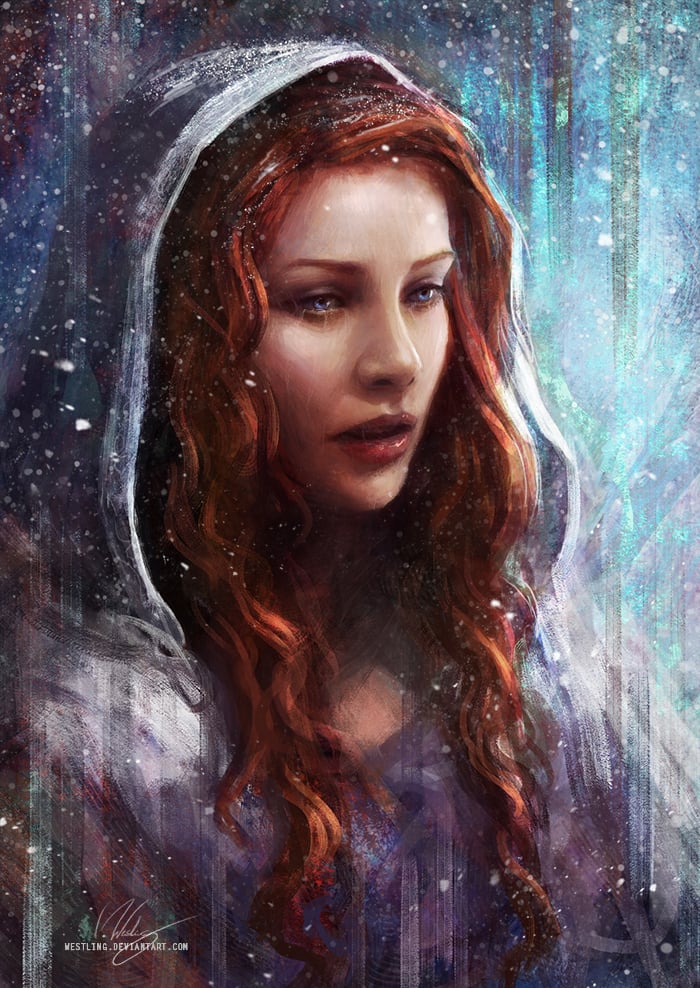Extroverted Intuition (Ne): Sansa is at the beginning of the books is very dreamy and doesn't entirely live in reality. She sees life as a fairy tale like in the songs, sees things as they could be, her idealized version of them: King’s Landing being so magical, Ser Dontos as her "Florian”, Margaery being her ideal big sister (when she’s actually manipulating Sansa). She tends to see the good in people (at first), and later she often correctly guesses the motives of people under Littlefinger's teachings. While Arya immediately dislikes the Lannisters without knowing any of them because Jon insulted them, Sansa senses that Jon is just jealous because he's a bastard (which is true). She sees what’s REALLY going on that others miss, noting that Joffrey is much more of a Lannister than a Baratheon, something the adults never realized. She’s at first willing to ignore Joff’s behavior at the trident to keep her dream of a fairy tale life from shattering. Even after she drops the rose colored glasses, she does keep some optimism and always hopes for a better life later. She struggles to see where Petyr ends and Littlefinger begins, and is never sure of who is the real deal. She learns to make up convincing lies easily and adopt a new persona as Lord Baelish's bastard daughter.
Introverted Sensing (Si): Sansa is proud of her Northern heritage and is always reminding herself that she is a Stark. She constantly refers back to songs, stories, and facts about people she’s learned and compares it to what’s going on currently. She sees Joffrey as the dashing prince who will marry her and fulfill her dreams because that's how it works in the stories. She misses home badly, and at the Eyrie shows her remorse through making a little snow replica of Winterfell. When in need of comfort, she goes for her favorite books, songs, or food. Sansa fits the traditional role of a noble lady very well and is happy with that position because it's always been good to her. It’s no secret that she tends to… remember things very subjectively. She’s again, very observant- she notices external details quite well ("[Littlefinger's] eyes did not smile when his mouth did"). She’s worked at becoming an accomplished lady for years and has many talents as a result. She knows what society expects her to do and is able to fit the role of a lady well. She bases much of her Alayne Stone persona as a noble bastard on her half-brother Jon Snow (being fourteen years old, being brave, not liking to dance, etc.).
Extroverted Thinking (Te): Sansa is able to be proactive- Father backing out of his promise and says he's shipping the girls home? Go ask the queen, the authority figure, to stop him. Father on death row? Go to Joffrey at court, charm him, and appeal for her father's life. At her worst, Sansa can be bossy and rude when she perceives something as incompetence, unfair, or irrational. When she and Sweetrobin must cross the narrow snowy bridge alone, she is able to keep herself and the boy calm, coach him and keep him focused until they're safely across. As Alayne Stone, she is able to run a household efficiently by herself and be more blunt in her views with people. She sets goals and works to meet them (get Cersei to convince Father to let her stay, do what she wants to keep the betrothel, win over Harry, etc).
Note: I don't know about TV!Sansa (who is both written differently from her book counterpart and has become inconsistently written anyway), but I would think she is still an INFP. I do think Sansa values social harmony to a degree, but because she's been taught to and because she personally dislikes conflict ruining her good time. Westerosi society values the Introverted Sensing a lot, especially in its women, so Sansa’s been taught to exercise it more- and it helps that both her parents are Si-doms, I don't think she uses it enough to be an ISFJ, and she gets bored or tired of people's company when she's around it too much and lives inside her own head, ruling out an extroverted type.











